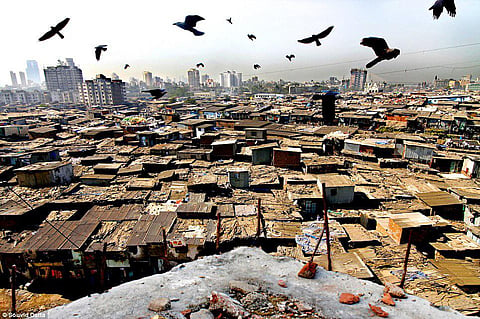

A small, dingy room, size 8 X 11 is all that Sukharanjan Dey has as his Kolkata address in a slum. The room is divided in two – one where latrine pot is placed and the other with a kitchenette and a bed. Shibendu Ghosh's dingy one-room has an asbestos roof which is perforated and leaks during the monsoon.
Dey is the secretary of West Bengal Slum Dwellers Organisation named the Paschimbanga Basti Unnayan Samity (PBUS), while Ghosh is the secretary of the Kolkata district committee of the organisation.
Many rooms in these slums have two or three-tier beds (bunker beds) and accommodate up to 12 persons in a single room. However, after the Left Front government brought in the Thika Praja Act in 1981, there has been a marked improvement in sewerage conditions of urban slum dwellers, Dey recounted.
In Kolkata, there are 5,534 corporation-registered slums with 14 lakh inhabitants, mostly unorganised sector workers.
However, of late, slumdwellers are facing a big threat to their existence, as cases of illegal land transfers are coming to light, Dey told NewsClick. There have been instances of mysterious fires in prime bustees, such as in No 4 Rammohan Mullick Lane or the Hazaar Bustee area, where thousands reside, after which some cases of illegal land transfers were reported.
Interestingly, both these properties are registered under the Thika Praja Act. Adjacent to Ram Mohan Mullick lane, a mall named Mani Square has come up on the bustee land, alleged the leadership of the slumdwellers organisation.
They alleged that the Hazaar Basti in Baghbazaar area of Kolkata is also a Thika Praja land and was "set on fire". The prime land was completely gutted and more than 500 residents there has to be given relief, collected by the PBUS.
The PBUS suspects that while land sharks were behind the fire at in Hazaar Bastee area, there were also allegations by some local residents that a religious organisation that wanted to take over the entire land may have also been involved.
Another area where displacement is taking place is Talla Bridge, where renovation work has led to eviction of 94 families, without any rehabilitation measure.
Of late, news of fire gutting slum dwellers properties is becoming quite common in many prime spots near EM Bypass, where Thika Praja lands are situated. The PBUS has also alleged that workers on corporation payroll employed by the Kolkata Corporation for sewerage and electrification work have been withdrawn, leading to incidents of fire in many of the properties.
A major demand of urban slum dwellers (most of whom are below poverty line or BPL families) is that the corporation provide free electricity up to 100 units against 25 units being given free at present. The previous Left Front Government used to give Rs 120 crore as electricity subsidy to help BPL families in the state, said the PBUS leaders, who also alleged that the BPL list hasn't been updated.
On March 28the PBUS started litigation against "paddy theft" after which the state government started giving rice and wheat to BPL and APL in ration shops.
The Left-leaning PBUS has got a long history of work for slum development since 1957, when it had revolutionary leaders Ganesh Ghosh and Narayan Roy as its patrons. It was in 1957, that a slum clearance Bill was introduced by Bidhan Chandra Roy, the then chief minister of the state.
The newly formed organisation then had fought pitched battles both inside the Assembly and outside seeking rights for slumdwellers. In 1949, to protect the erstwhile zamindars (landlords) the Thika Tenancy Act 1949 was introduced. The zamindars became slum landlords under this Act. However, the slumdwellers movement forced the government to undertake bustee rehousing schemes in the city.
Earlier, the zamindars did not take any responsibility for development of sewerage system inside the bustee premises, as a result bustee residents resided like third class citizens. It is after 1981, with the LF government's Thika Praja Act, that slumdwellers became owners of the land and the office of a thika controller was established, which was empowered to deal with disputes and vested with magisterial powers.
After 2011, with the defeat of the LF government, a clause regarding appeal to the thika controller regarding declaration as tenant was changed by the new state government, said the PBUS leaders. In the process, the names of many people living in the slums got deleted. This encouraged land sharks and promoters to trade in prime bustee land. Now, between the lesser and the lessee, a third party can enter, and an atmosphere of fear prevails in some areas where land is allegedly being forcibly taken over by the anti-social elements and promoters, allege the PBUS leaders, who are now intervening and mobilising bustee people wherever eviction is being done without rehabilitation.
First published by Newsclick.